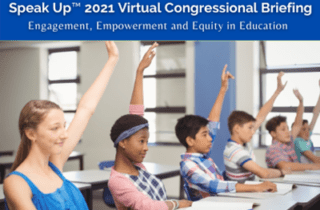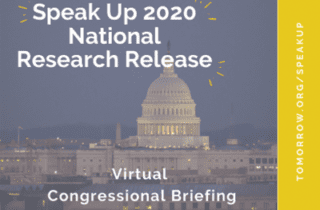Throughout the pandemic, we were all part of a live virtual experiment on how to make it work, said Dr. Julie Evans, CEO of Project Tomorrow. During the Speak Up 2021 Congressional Briefing: Release of the National Research Findings, Dr. Evans, along with a panel of K-12 student voices, discussed findings from this year’s Speak Up Research Project. Focusing on student engagement, student empowerment, and equity in education, they shared key lessons educators learned during the lockdown.
Presented by Dr. Julie A. Evans, Chief Executive Officer, Project Tomorrow; and a panel of K-12 students
Presented by Glenn Whitman, Executive Director, The Center for Transformative Teaching & Learning
For the last seven months of 2020, school districts have gone through extreme changes regarding how learning is happening in a pandemic-induced educational environment. In a recent edWeb edLeader Panel sponsored by Project Tomorrow, Dr. Julie Evans, CEO of Project Tomorrow, and Christina Fleming, Vice President of Blackboard K12, presented the Speak Up 2019-2020 National Findings titled Digital Learning During the Pandemic: Emerging Evidence of an Education Transformation. The research surveyed over 136,000 K-12 students, teachers, and parents and focused on what digital learning looked like during the pandemic and revealed potential emerging transformation evidence.
Presented by John Bielinski, Ph.D., Senior Director of Research & Development, Illuminate Education; Rachel Brown, Ph.D., NCSP, Senior Academic Officer, Illuminate Education; and Kyle Wagner, Ph.D., NCSP, Research Associate, Illuminate Education
Presented by Julie A. Evans, Ed.D. and a panel of K-12 students
Connect, extend, and challenge your current understanding of how the brain learns and classroom practices with new ideas and ways of engaging with students at home or online.
In this edWebinar, see how 200 teachers worked with nearly 4,000 studentsin grades K-8 to move to blended and personalized learning
Education research is meant to improve teaching and learning. Since the actual ideas for research are often driven by the interests of the funding sources, though, there’s a potential disconnect between what research schools need versus what they’re getting. When presenting Digital Promise’s new Challenge Map, which explores issues, ideas, and resources for K-12 challenges, Babe Liberman, M.Ed., Research Project Manager for Digital Promise, said the current pipeline means schools are passively waiting for the right research and opportunities to come their way. In the edWebinar “Shaping the Future of Education Research: Digital Promise’s Challenge Map,” Liberman explained the purpose of the Map, how it was created, and how schools can develop their own.
Learn how the Digital Promise Research team collaborated with the League of Innovative Schools to discover which challenges these districts prioritize.









